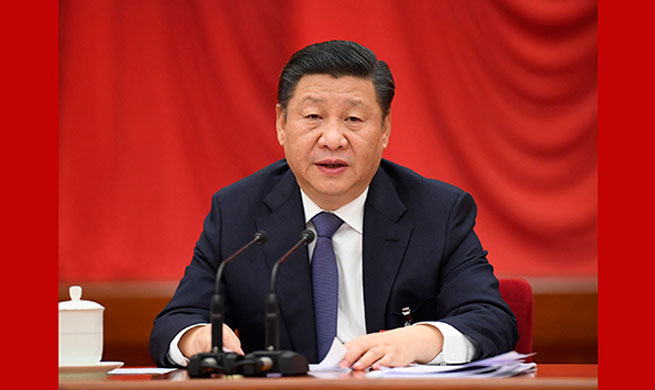TIANJIN, Jan. 19 (Xinhua) -- North China's Tianjin Municipality announced Friday the economy of the city expanded by only 3.6 percent in 2017, 5.4 percentage points lower than the rate of 2016.
The municipality's gross domestic product totaled nearly 1.9 trillion yuan (about 290 billion U.S. dollars) in 2017, said Chu Liping, deputy head of the Tianjin Municipal Bureau of Statistics.
Tertiary industry in Tianjin grew 6 percent to more than 1 trillion yuan last year.
Chu attributed the low growth to the decreasing role of the city's industry and services, and a sharp decline in the real estate industry.
The municipal figures were released after Binhai New Area, a major economic development zone of the city, revised its GDP down 33.4 percent to 665 billion yuan in 2016.
Many companies registered in the area had taken into account of the production figures of their factories elsewhere, leading to double counting during GDP calculation.
"Tianjin's GDP growth in 2016 is not effected by the revised figure in Binhai New Area, as we did not take into account of the production figures of their factories elsewhere during GDP calculation," said Chu.
Tianjin's Binhai New Area is the latest, but not the first, regions to admit data inflation.
Earlier this month, north China's Inner Mongolia Autonomous Region cut the fiscal revenue in 2016 by 53 billion yuan, or 26.3 percent of the total. Some local governments were found to falsify the fiscal revenue figures by requiring companies to pay more taxes and then refund the extra amount later.
The issue of inflated data originates from the obsession some local officials have for impressive figures, which could bring political benefits under previous official evaluation measures.
Last year, northeast China's Liaoning Province admitted economic data had been falsified from 2011 to 2014. In response to the problem, the province reported a 2.5-percent drop in its 2016 regional GDP, compared with a 6.7-percent expansion in national GDP.
In response to local GDP data inflation, Ning Jizhe, head of the National Bureau of Statistics (NBS), said Thursday that national economic figures were not be affected by inaccurate figures in some regions, companies and institutions.
Ning said the discrepancy between the added amount of local economic figures and the national amount lay in accounting at different levels. The difference in 2016 was 3.6 trillion yuan.
To solve the problem, China unveiled a plan last June to unify GDP calculation in 2019.
According to the plan, the NBS will work with regions and statistics agencies for a unified GDP calculation to replace the current system, in which national GDP and regional data are calculated separately by the NBS and regional offices.
















